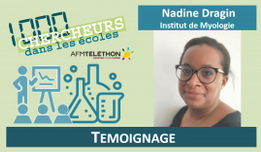 Nadine Dragin is among the first scientific experts to be going out to meet high school students for the 2020 edition of Operation 1000 researchers at schools based in France and abroad. Despite the current health situation and the constraints that it imposes, she did not hesitate to go out and meet a few dozen high school students. In this interview, given during her very first visit, she describes her daily life as a researcher and her commitment to this ‘Operation’.
Nadine Dragin is among the first scientific experts to be going out to meet high school students for the 2020 edition of Operation 1000 researchers at schools based in France and abroad. Despite the current health situation and the constraints that it imposes, she did not hesitate to go out and meet a few dozen high school students. In this interview, given during her very first visit, she describes her daily life as a researcher and her commitment to this ‘Operation’.
At the Institute of Myology, Nadine Dragin is part of the ‘Myasthenia Gravis: aetiology, pathophysiology and therapeutic approach’ team headed by Rozen Le Panse, at the Myology Research Centre, which aims to better understand the pathophysiological mechanisms relating to autoimmune myasthenia gravis, and to shed light on the events that trigger and sustain this disease, with the long-term goal of offering new targeted therapies for patients.
“As part of this team, in my capacity as a researcher, I try to understand the impact of environmental factors in triggering autoimmune diseases such as myasthenia. At the same time, after identifying an immune system imbalance in myasthenia patients, I try to develop a new therapeutic approach to autoimmune myasthenia using mouse models.”
Her mission: to understand and search for therapeutic options… but also to share with youngsters the interactive richness and diversity in the scientific world
“The myasthenia team has a very close relationship with the AFM-TELETHON Interest Group, a patient group involved with this disease. A close collaboration has been maintained in national and European projects. Indeed, my research work has been enriched and helped by the interactions I have had with patients.
When ‘Operation 1000 researchers’ was set up, it seemed to me that participating was in natural continuity with my civil society work. This Operation helps to show that research is like a ‘hive with a diverse range of expertise and knowledge’, accessible to everyone. It allows us to say, simply, that research into muscle diseases still needs public finance support via the Téléthon, and that it is a vector for therapeutic and scientific advances across all diseases.”
Researchers motivated by the idea of this Operation and curious students
“In this week that marks the start of ‘Operation 1000 researchers’, I started at Saint-André de Cubzac in the Gironde. The team of Life and Earth Sciences teachers at the Cousteau Lycée loves this Operation and is committed to opening up fields of possibility for around 50 high school students. This team was delighted that the Operation was able to go ahead! And so was I! The use of masks and the various health measures did not restrict my interaction with students.
Once I was at the school, being in contact with the students and answering their questions made me forget the health situation and the current climate! It was a real breath of fresh air. Certain institutions that I had selected proceeded with the Operation by opting for videoconferencing. It is a different experience, but this videoconferencing approach will make it possible, this year, to engage with institutions where access could be complicated!”
